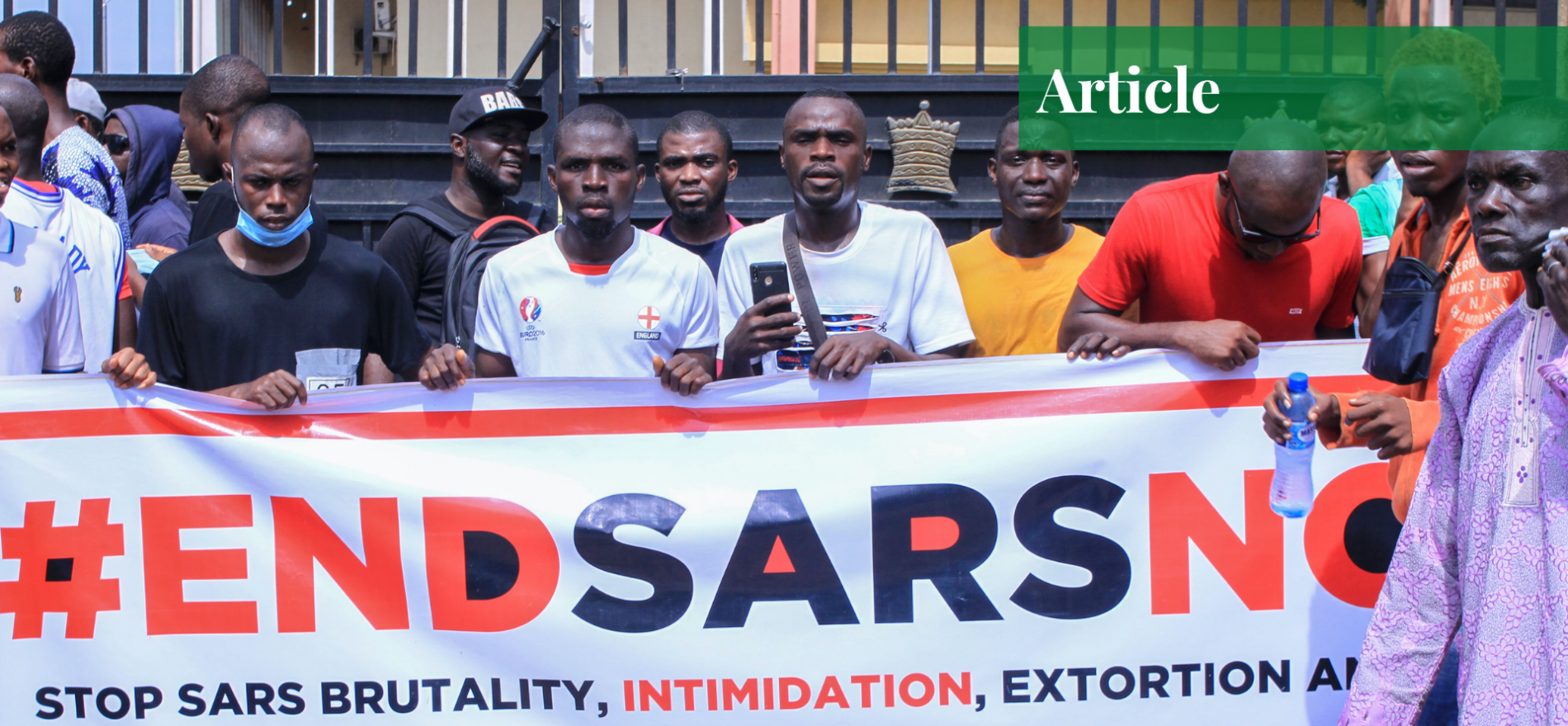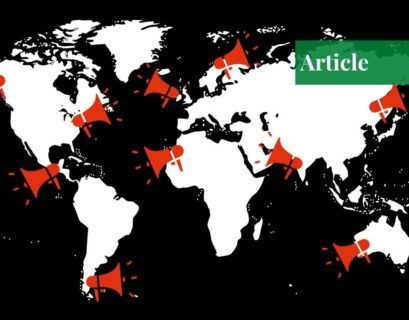Sarosh is currently doing her MPhil in English Literature from Forman Christian College. She is an English literature graduate from Kinnaird College for Women. Her research interests involve Western philosophy, Freudian psychology, and Transnational studies.
Background on SARS
Under the Nigerian Police Taskforce, the Special Anti-Robbery Squad (SARS) was enforced in 1992 to control crime rates within Nigeria concerning abduction cases, firearm dealings, car theft, armed robbery, cattle rustling, etcetera. However, the squad has maintained a record of a series of sexual assault cases, making young Nigerians a target of harassment, unwarranted searches, unlawful arrest or detention, etcetera.
Simeon Danladi Midenda, the founder of SARS, initially introduced forces operating in plain clothes for crimes within Nigeria to receive “the element of surprise”. According to police commissioners’ statements, the SARS unit’s activities were fulfilled in plain clothes and vehicles to diminish the crime rate parading the streets as an unidentified workforce.
Years of Silent Oppression
The police unit operations under SARS took a damaging turn for Nigerians who became vulnerable targets for the squad that would enforce stop-and-search and detainment for farcical causes. The chief executive of Bundle Africa in contact with an American friend was seen by the SARS as an act of fraudulence; Yele Bademosi was threatened with physical torture and the officers forcefully connected to his banking apps until three in the morning.
Many cases carry living proof on social media presently. On June 8th, 2018, a student from South Nigeria, Daniel Ekanem, shared a series of photographs from the police station where he was held hostage along with eleven others accused of being cult members. He tweeted, “We’re at IKOT EKPENE area command. They’re taking us out to the back 1 by 1 beaten mercilessly and brought back in. I’m hiding n trying to broadcast this.”
The abuse of power has been a dominant goal of the SARS officers, which took to a social media outcry for the Nigerian government to fight police brutality. The list of crimes and injustices by the SARS that remain unsolved cases to date go back to 2012 as experiences shared on social media recount illegal raids, extortion, organ sale, and kidnapping accounts.
Iloanya Chijioke John paid a visit to a child dedication service arranged eight years ago in Ajali, Anambra State. His attendance was followed by an unwarranted raid by the SARS, where all young men were taken to a detention facility. Despite claiming their son’s presence, Chijoke’s existence within the facility was denied by the unit’s officer-in-charge in 2012 to his parents.
Calling for Dissolution
The struggle to halt the SARS’s unlawful practices continued as the current guiding figure of the #EndSARS campaign, Segun Awosanya, in unison with various activists, spoke against alleged cases against the treatment of police officers towards their victims. Commenting on the intense history of offenses by SARS officers, he deemed the accountability of their crimes the resoluteness behind the protests, “The position of the people… is not negotiable. We are asking for a shutdown of a demonstrably criminal network within the police structure and a general reform in the police.”
As some of the protests lost a sense of law and order within the state after hijacking the assembly and camping overnight, Mudashiru Obasa, Speaker of the Lagos State House of Assembly arranged an emergency meeting and asked the National Assembly to investigate further the history of maltreatment at the hands of the SARS. The Lagos State Commissioner of Police, Hakeem Odumosu, was also directed to enforce safeguarding of the protestors working in the interest of reformation.
Nigerian Government Addresses the Concerns
After Nigerians marched the streets to voice their utter revulsion against the mistreatment of the SARS, the Nigerian police chief Mohammed Adamu made the following announcement, “The Special Anti-Robbery Squad (SARS) of the Nigeria Police Force @PoliceNG has been dissolved WITH IMMEDIATE EFFECT”. This step forward was ensured after the people of Nigeria walked the street together in solidarity against the SARS, which had become notorious for violence, bribery, sexual assault, unlawful arrest, etcetera.
However, Police Chief Adamu further announced a new policing arrangement on October 11th, 2020, redeploying all officers and men to other departments and units within the country. Many Twitter users unanimously agreed to this step as the initial successful start to a larger movement that can ensure Nigerians a respite from the squad’s brutality and unjust systemic torture.
Despite the decision being a clear manifestation that the Nigerian government was conscious of its citizens’ rights, many internet users and advocates of justice expressed their displeasure over despotism with unresolved crimes committed by the SARS.
The announcement was followed by complaints issued by the #EndSARS campaign’s leading figures, including Osinbajo, a former law professor who demanded the committee’s inaugural working to ensure and protect the cases of misconduct inflicted unlawfully upon vulnerable Nigerian citizens by members of the SARS.
#EndSARS Protests Meet with Resistance
The recent event surrounding #EndSARS has become a topic of concern after the police officers’ reaction towards protestors in Nigeria demanding justice grasped worldwide attention on social media. The dispersed Nigerians, activists, and human rights lawyers in Abuja, Lagos, and Osun began recording and sharing responsible authorities’ failures to listen to Nigerian concerns. As protestors paraded Abuja’s streets heading towards Central Business District, the police officers responded by firing teargas to inculcate forceful dispersal.
As these vulnerable seekers of justice were chased with teargas, some received injuries during the process, whereas others were caught and subdued with beatings. The protestors in Ogbomoso standing and raising slogans to demand justice for the fatal shooting of Jimoh Isiaq; the #EndSARS campaigner received critical injuries with many shots after soldiers and police officers opened live rounds on them.
This deadly treatment on 11th October, 2020, of robbing the people of Nigeria of the right to protest and unjust killings was enforced hours after Inspector-General Mohammed Adamu conveyed to the world the dismissal of the SARS. Surulere #EndSARS protestors were met with an explosive end when the police officers retaliated with open fire, causing a young man’s demise.
The Lekki Massacre
It is confirmed by Amnesty International that at least twelve demonstrators were killed after the Nigerian army opened fire on the peaceful protesters at the Lekki Toll Gate and Alausa on 20th October, 2020. The country director of Amnesty International Nigeria, Osai Ojigho, calls this act “a blatant violation of people’s rights to life, dignity, freedom of expression and peaceful assembly”. Although the Nigerian army regards the shooting reports as spurious, the power outage prior to the massacre and the bloodied streets shortly thereafter claim otherwise.
If you want to submit your articles and/or research papers, please check the Submissions page.
The views and opinions expressed in this article/paper are the author’s own and do not necessarily reflect the editorial position of Paradigm Shift.



















